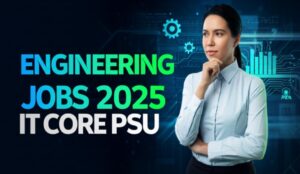The engineering landscape is always evolving, offering dynamic and exciting career paths for both emerging talents and seasoned professionals. As we look towards 2025, the demand for skilled engineers continues to grow across diverse sectors. Whether you are a recent graduate eager to start your journey or an experienced engineer seeking new challenges, understanding the current trends is crucial. This article provides a comprehensive overview of job opportunities in the IT sector, core engineering disciplines, and Public Sector Undertakings (PSUs). We will explore roles, essential skills, salary expectations, and key insights to help you navigate your career path successfully.
Navigating Engineering Opportunities in 2025
The world of engineering is incredibly vast. It offers countless specializations and areas for impact. For many, finding the right fit can feel like a complex puzzle. Understanding the differences between key sectors can simplify this search. In 2025, particular industries show significant potential. We will delve into these areas to illuminate the best pathways for your career growth.
The Dynamic Landscape of Engineering Careers
Engineering careers are no longer confined to traditional roles. Today’s engineers often work at the intersection of various disciplines. This creates opportunities for innovation and problem-solving on a global scale. From developing cutting-edge software to designing critical infrastructure, engineers shape our future. This guide will help you understand where your skills can make the biggest difference. It focuses on Engineer Jobs 2025 in high-growth sectors.
1. IT Sector Jobs: A Hub for Innovation
The information technology (IT) sector remains a powerhouse for engineering careers. It consistently offers abundant opportunities. This is true for Freshers Engineer Jobs and experienced professionals alike. The pace of innovation in IT means continuous demand for new talent. This sector thrives on creativity and technical expertise. Engineers here develop the digital tools that power our modern world.
Software Developer and Engineer Roles: High Demand and Rewarding
Software development is at the forefront of IT engineering careers. There is an increasing demand for skilled software developers. These professionals work across various specializations. This includes full-stack, front-end, and back-end development. Specialized areas like machine learning and cybersecurity engineering also show strong growth. For new graduates, entry-level positions like Associate Software Engineer are common. These roles offer competitive starting salaries. For example, in tech hubs like California, freshers can expect annual salaries ranging from $90,000 to $115,000. Experienced developers command significantly higher pay. A Machine Learning Engineer, for instance, typically earns between $181,875 and $200,645 per year. These figures highlight the rewarding financial prospects within IT.
Essential Tech Skills for IT Engineers
To succeed in IT Engineering Careers, a strong technical foundation is vital. Key programming languages are essential. These include JavaScript, HTML, CSS, and Python. Familiarity with Linux operating systems is also highly valued. Beyond coding, software testing, debugging, and version control are crucial daily tasks. Knowledge of cloud technologies, such as AWS, Azure, or Google Cloud Platform, is increasingly important. For more advanced roles, expertise in system design, data structures, and complex algorithms is a must. The ability to apply AI and machine learning concepts is also becoming a core competency for many positions. Continuously updating these skills ensures long-term career viability.
Work Models and Comprehensive Benefits
The IT sector is known for its progressive work arrangements. Many companies offer fully remote, hybrid, or on-site options. This flexibility allows engineers to choose a model that best suits their lifestyle. Beyond work models, IT companies often provide generous benefits packages. These can include 401(k) matching programs, substantial paid time off, and comprehensive health and vision insurance. Some companies even offer parental leave and student loan repayment programs. These benefits contribute to a high quality of life and attract top talent. It’s a sector that truly invests in its employees’ well-being.
Leading Employers in the IT Sector
The list of companies hiring IT engineers is extensive. Tech giants like Google are constantly recruiting. Many innovative tech startups also seek fresh talent. Enterprise IT firms across the United States are expanding their engineering teams. Key regions for these opportunities include major tech hubs. California, particularly Silicon Valley, remains a prime location. New York and Massachusetts, especially Cambridge, are also significant centers for IT innovation. For those seeking entry-level software engineer positions in California, these areas present fantastic starting points. These locations offer a vibrant ecosystem of technological advancement.
2. Core Engineering: Foundational Roles with Evolving Demands
Core engineering disciplines form the backbone of our physical world. These traditional branches are essential for building and maintaining infrastructure. While sometimes seen as less glamorous than IT, these roles offer immense satisfaction. They contribute to tangible products and critical services. Core Engineering Jobs are vital for societal progress. They demand a deep understanding of physical principles.
Diverse Roles Across Traditional Branches
Core engineering encompasses several foundational fields. These include mechanical, civil, electrical, and electronics engineering. Each branch plays a unique role in industry. Mechanical engineers design machines and systems. Civil engineers build infrastructure like bridges and roads. Electrical engineers work with power and control systems. Electronics engineers focus on circuits and devices. Positions like Engineering Technologist or Data Engineer roles are increasingly found in both government and private sectors. While detailed fresher openings might be less explicitly highlighted online compared to IT, opportunities exist. They often require a solid grasp of fundamental engineering principles and practical application.
Critical Skills for Core Engineering Excellence
Practical engineering knowledge is paramount for core engineers. This includes a deep understanding of physics, mathematics, and material science. Familiarity with design software, such as CAD (Computer-Aided Design), is also essential. Engineers must understand various manufacturing processes. They might also need programming skills for automation and embedded systems. Multi-disciplinary skills are becoming increasingly valued. For example, a civil engineer might benefit from data analysis skills. An electrical engineer might need to understand software integration. This blending of traditional and modern skills prepares engineers for future challenges. My friend, a mechanical engineer, recently learned Python for data analysis, enhancing his career prospects significantly.
Salary Trends in Core Engineering
Salaries in core engineering jobs show a wide range. This depends heavily on the specific sector, years of experience, and geographical location. Generally, starting salaries for freshers tend to be lower than those in comparable IT roles. However, experience and specialization can lead to substantial growth. Public Sector Undertakings (PSUs) often offer competitive compensation for core engineers. These roles frequently provide stability and a clear career progression. Unfortunately, detailed nationwide average salaries for freshers in specific core engineering disciplines are not consistently available in the provided research. This makes a precise comparison challenging. However, the long-term career stability often outweighs initial lower pay for many.
An infographic or bar chart could effectively illustrate the average fresher and experienced engineer salaries across IT, Core Engineering, and PSU sectors. This would visually highlight the salary disparities and growth potential in each domain, making complex data easily digestible.
3. PSU (Public Sector Undertakings): Stability and Impact
Public Sector Undertakings (PSUs) in India offer unique and stable career paths for engineers. These government-owned corporations play a critical role in national development. They span sectors like energy, infrastructure, manufacturing, and telecommunications. PSUs are often sought after for their job security and comprehensive benefits. They represent a significant segment of PSU Engineer Recruitment. Many engineers value the opportunity to contribute directly to public good.
Recruitment Pathways for Freshers and Experienced Professionals
PSUs actively recruit engineers across both IT and core branches. This recruitment typically occurs through highly competitive national examinations. Examples include the GATE (Graduate Aptitude Test in Engineering) exam. They also recruit through campus placements at top engineering institutions. Positions like Engineering Technologist or specialized Data Engineer roles are commonly available. PSUs place a high value on domain-specific knowledge and strong academic records. For freshers, securing a position in a PSU often means a stable career path from day one. Experienced professionals can find opportunities for leadership and significant project management roles. These roles offer a sense of national contribution.
Comparing PSU to Private IT Sector Opportunities
When considering a career in a PSU, it’s essential to weigh its advantages against the private IT sector. PSU jobs are renowned for their exceptional job security. They offer defined pay scales and attractive perks. These often include pension schemes, housing allowances, and comprehensive healthcare. These benefits provide a robust safety net for employees. However, salary growth in PSUs may be slower compared to the rapid increments seen in private IT firms. The work culture can also differ, often being more structured and bureaucratic. While a private IT firm might offer quicker financial gains, PSUs provide a unique blend of stability, work-life balance, and the satisfaction of public service. It’s a personal choice based on individual career priorities.
Modernization and Digital Transformation in PSUs
Many PSUs are actively modernizing their operations. They are increasingly incorporating digital technologies into their processes. This shift creates new demands for engineers. PSUs now seek candidates with hybrid skills. They value those comfortable with both traditional engineering principles and emerging technologies. This includes areas like data analytics, IoT (Internet of Things), and automation. This trend enhances opportunities for freshers with multi-domain knowledge. It also offers existing employees chances to upskill. The digitization push aims to improve efficiency and service delivery. It reflects a forward-thinking approach within the public sector. This modernization makes PSU official portals increasingly relevant for diverse engineering talent.
Key Insights and Emerging Trends for Engineers in 2025
Understanding the broader trends can give engineers a strategic advantage. The job market is dynamic, and certain patterns are clearly emerging for 2025. Keeping these in mind can guide your skill development and job search. These insights highlight the evolving needs of various industries.
- Growing IT Sector Opportunities: Software development remains the largest employer for engineers. There is a strong emphasis on skills in AI, machine learning, cloud computing, and cybersecurity. These areas offer significant growth potential for both 2025 software developer jobs and other IT roles.
- Bridging Core and IT Skills: Core engineering roles increasingly require complementary IT skills. This includes data analysis, understanding of IoT applications, and embedded systems development. Engineers who can combine traditional knowledge with tech skills will be highly sought after.
- PSU Digitization: Public Sector Undertakings are actively embracing digital transformation. They seek engineers comfortable with both traditional engineering and emerging technologies. This creates enhanced opportunities for freshers with multi-domain knowledge and experienced professionals looking for impactful work.
- Remote & Hybrid Work: IT jobs continue to offer flexible work options. This includes fully remote and hybrid models. This trend is expected to continue and further evolve, providing greater work-life balance for many engineers.
- Salary Disparities: The IT sector generally offers significantly higher average salaries than core engineering roles. This is true in both private and PSU sectors, especially for mid-level and experienced professionals. Freshers entering IT may also find more lucrative starting packages.
An infographic showcasing the top 5-7 most in-demand tech and core engineering skills for 2025 would be highly beneficial. It could visually represent each skill with a brief explanation, helping job seekers prioritize their learning and development efforts.
Essential Resources for Your Engineering Job Search
A successful job search requires effective tools and targeted strategies. Leveraging the right resources can significantly streamline your efforts. From major job boards to specific skill development platforms, knowing where to look is key. This section provides a practical guide to help you land your dream Engineer Job 2025.
Key Job Search Tools and Locations
When searching for engineering opportunities, several platforms stand out. Job boards like Indeed are excellent for comprehensive listings. Google Careers offers direct access to roles at one of the world’s leading tech companies. For PSU specific roles, consistently checking PSU official portals and Myworkdayjobs is crucial. Geographically, certain locations remain hotspots for engineering talent. Silicon Valley in California, New York City, and Cambridge in Massachusetts are primary tech hubs in the US. For opportunities in India, Bangalore continues to be a major center for IT and R&D. Targeting these areas can increase your chances of finding relevant entry-level software engineer jobs or experienced positions.
Suggested Skill Development for a Competitive Edge
To stay competitive, continuous learning is non-negotiable. For IT professionals, focusing on advanced programming languages is beneficial. Deep dives into system design, artificial intelligence (AI), and machine learning (ML) are highly recommended. For core engineers, enhancing skills in embedded systems and advanced CAD software is valuable. Project management skills are also universally applicable and highly sought after. Consider online courses, certifications, and personal projects to build a strong portfolio. This proactive approach shows potential employers your commitment to growth and readiness for future challenges.
Sector Comparison at a Glance
To help you visualize the differences, here is a concise comparison of the three major engineering sectors:
| Feature | IT Sector | Core Engineering | PSU (Public Sector Undertakings) |
| Typical Roles | Software Developer, ML Engineer, Cybersecurity Engineer | Mechanical, Civil, Electrical, Electronics Engineer | Engineering Technologist, Data Engineer |
| Freshers Salary (Avg.) | ~$90,000 – $115,000 (e.g., California) | Generally lower than IT (Specifics not detailed) | Defined pay scales, often enhanced (Specifics not detailed) |
| Experienced Salary (Avg.) | ~$181,875 – $200,645 (ML Engineer) | Wide range depending on discipline (Specifics not detailed) | Slower growth compared to private IT (Specifics not detailed) |
| Key Skills | Python, JavaScript, Linux, Cloud, AI/ML, Data Structures | CAD, Manufacturing, Practical Engineering, Automation | Domain-specific knowledge, IT/Core hybrid skills |
| Work Models | Remote, Hybrid, On-site | Primarily On-site (Implied) | Primarily On-site (Implied) |
| Benefits | 401(k), PTO, Health, Parental Leave, Loan Repayment | Varies by company (Not detailed) | Job security, Pension schemes, Government benefits |
Watch: Essential Tips for Your Engineering Career in 2025
To further aid your job search, here’s a helpful video with practical advice. This resource covers crucial aspects of preparing for the competitive engineering job market. It offers actionable strategies for both new graduates and those with years of experience.
This video, titled “How to Get Your First Software Engineering Job in 2025 | Tips for Freshers & Experienced”, offers valuable insights. It covers essential resume tips, effective interview preparation strategies, and highlights key skills needed. It is perfect for both entry-level and experienced software engineers. It will help you prepare thoroughly for the 2025 recruitment cycle.
Frequently Asked Questions (FAQs)
What are the top skills for Freshers Engineer Jobs in 2025?
For freshers, strong programming skills in Python, JavaScript, HTML, and CSS are crucial. Knowledge of Linux, cloud technologies, and software testing is also vital. Understanding data structures and algorithms provides a competitive edge, particularly in IT Engineer Jobs 2025. Continuous learning of new tools is highly recommended for all disciplines.
How do salary expectations differ for IT vs. Core Engineering roles?
IT sector roles, especially in software development, generally offer higher starting and mid-career salaries. For example, freshers in California IT can earn $90,000-$115,000. Core engineering roles typically start lower, though specific salary data for core freshers is not detailed in the research. Compensation often grows significantly with specialized experience and location.
Why are PSU Engineer Recruitment opportunities attractive for many engineers?
PSU engineer recruitment is attractive due to exceptional job security and comprehensive government benefits. These include stable pay scales, pension schemes, and healthcare. While salary growth might be slower than in the private IT sector, the long-term stability and opportunity to contribute to national development are major drawcards. Many PSUs also offer clear career progression paths.
Are remote or hybrid work options common for Experienced Engineer Vacancies?
Yes, remote and hybrid work options are increasingly common, particularly for Experienced Engineer Vacancies in the IT sector. Many companies now offer flexible arrangements, allowing engineers to work from home or combine office and remote days. This trend provides greater flexibility and work-life balance, appealing to a broad range of experienced professionals. Core and PSU roles are typically more on-site.
What are the key locations for Engineer Jobs 2025?
For IT, major tech hubs like Silicon Valley (California), New York, and Cambridge (Massachusetts) remain prime locations. Bangalore in India is also a significant center. For core engineering and PSUs, opportunities are spread across various industrial and government centers. This includes places with large manufacturing or infrastructure projects. Specific job boards can help pinpoint regional opportunities.
Conclusion: Charting Your Engineering Career Path
The engineering job market in 2025 is rich with opportunity. It caters to a wide array of skills and career aspirations. Whether you are seeking high-growth IT Engineering Careers, foundational Core Engineering Jobs, or the stability of PSU Engineer Recruitment, thorough preparation is key. Focus on developing in-demand technical skills, understanding industry trends, and leveraging available resources. For freshers, securing that first role requires dedication and a strong foundational skillset. For experienced engineers, continuous learning and adapting to new technologies will unlock further Experienced Engineer Vacancies. Remember, the engineering field is constantly evolving. Staying informed and agile will be your greatest asset in building a successful and fulfilling career. While this article provides a snapshot for 2025, always verify current trends and specific job requirements as the market continues to shift.






